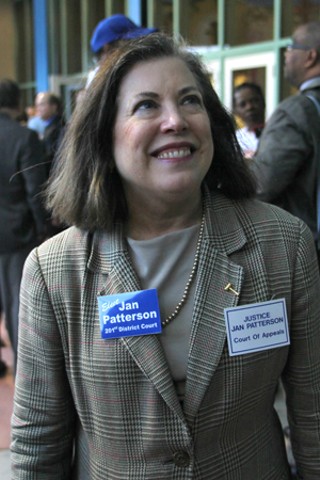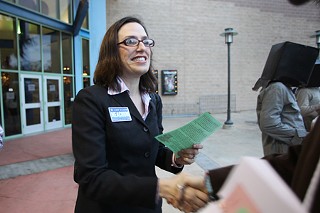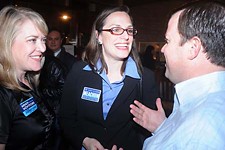Political Dust Clouds 201st: Patterson vs. Meachum
Is the candidate with most experience also a liability?
By Jordan Smith, Fri., Feb. 12, 2010
In the race to replace retiring Judge Suzanne Covington on the civil bench of Travis County's 201st District Court, there's no question that Democrat Jan Patterson, currently a judge on the state's 3rd Court of Appeals, has the most experience. Patterson, who began her career as a civil litigator in New York before becoming a federal prosecutor there, has served on the bench of what has been the state's most important appellate court since 1999. All that experience is undeniable and impressive, but Patterson is also the candidate carrying the most political liability.
In July 2009, Patterson wrote a letter to Gov. Rick Perry asking that he consider her for appointment to the county's 353rd Judicial District Civil court, suddenly vacant after the untimely death of Judge Scott Ozmun. Although it was already generally known that Patterson planned to step down from the 3rd Court to run for the local bench in 2010, the idea that she would consider stepping down more than a year before the election caught the Democratic faithful off-guard – and angered quite a few.
The objection was frankly political and largely strategic. The 3rd Court considers appeals from state agencies and handles ethics cases, among other important duties, and in recent years it's been at the center of major political cases. Patterson's early retirement would allow Perry the chance to replace her with a Republican (making the court 4-2 GOP) who would enter the fall 2010 campaign carrying incumbency – and a major ID and fundraising advantage. (In the end, Perry appointed Republican Jeff Rose to the seat, reportedly after state Sen. Kirk Watson privately let the Governor's Office know that he would block Patterson's move. Watson would not discuss his conversations on the appointment.)

Beyond this political dispute, more pointed questions were raised about Patterson's backroom handling of the matter. When the Chronicle initially reported the story in October, Patterson said that Perry's office had pursued her for the appointment; the Governor's Office later told us that was not true and, after open records requests, released Patterson's two letters requesting the appointment. Patterson initially said the requests never happened; after the publication of the letters, she said they were written at the request of the Governor's Office. In the wake of the episode, former state Rep. Glen Maxey filed a formal ethics complaint against Patterson with the State Commission on Judicial Conduct. Rightly or wrongly, the controversy has shadowed Patterson's race for the Travis court and has given her opponent, civil litigator Amy Clark Meachum, a decided political edge. Indeed, without Patterson's precipitating attempt to jump benches, it's likely that she would have drawn no opponent for a lower bench. Now she's in a fight to survive.
If campaign contributions are any measure, Meachum's star is on the rise; she added roughly $19,000 to her war chest in January, against roughly $15,400 for Patterson. Meachum, a partner with McGinnis, Lochridge & Kilgore who represents both plaintiffs and defendants in civil litigation, has no bench experience but has earned the endorsements of Democratic clubs (plus the Austin Black Lawyers Association and Hispanic Bar Association of Austin) and has racked up the support of many area legislators (including Watson and Austin Reps. Eddie Rodriguez, Mark Strama, and Valinda Bolton) and a host of local officials (including Travis County Attorney David Escamilla and Austin Mayor Lee Leffingwell). Patterson, meanwhile, also lists Strama among her supporters, along with state Rep. Donna Howard and former District Attorney Ronnie Earle.
To Meachum, her experience trying cases on both sides of the docket distinguishes her candidacy. "These are the courts where my practice has been for the last 10 years," she wrote. She'd like to see the courts reduce filing fees for low-income people and wants to institute a mentoring program pairing young lawyers with indigent clients. "There are instances where costs limit access" to the courts, she wrote. "It is unfair to prohibit parties from having their day in court just because they cannot afford a filing fee." She's current on district court practices, she says, and enjoys the "daily give and take of the district courthouse." Moreover, the trial courts are the "legal trenches, versus the appellate courthouse" where Patterson has spent her career, "which is much more of an ivory tower institution" – that is, largely confined to exchanges of formal briefs and oral arguments.
Patterson counters that it's her experience and proven ability as a judge that makes her the better candidate. "Appellate work makes for better trial work," she says, in part because she understands how to perfect a trial record. And, she says, as a judge she's always "gotten the facts right." Nobody could "suggest that I've ever stretched the facts or gotten the facts not right." In sum, she says, "nobody would have to speculate about what kind of judge I'd be."
Reconsidering the dust-up over her application for appointment to the 353rd Court, Patterson now insists that she never "sought to undermine" the work of the 3rd Court. "I do lament the controversy," she says. "I'll concede perhaps I made a mistake – if I hadn't, I wouldn't be having all of these conversations" about what happened. Still, she says that though she "did contribute to this controversy," any "suggestion that I was not truthful" about what happened "is simply not right."
Got something to say on the subject? Send a letter to the editor.










